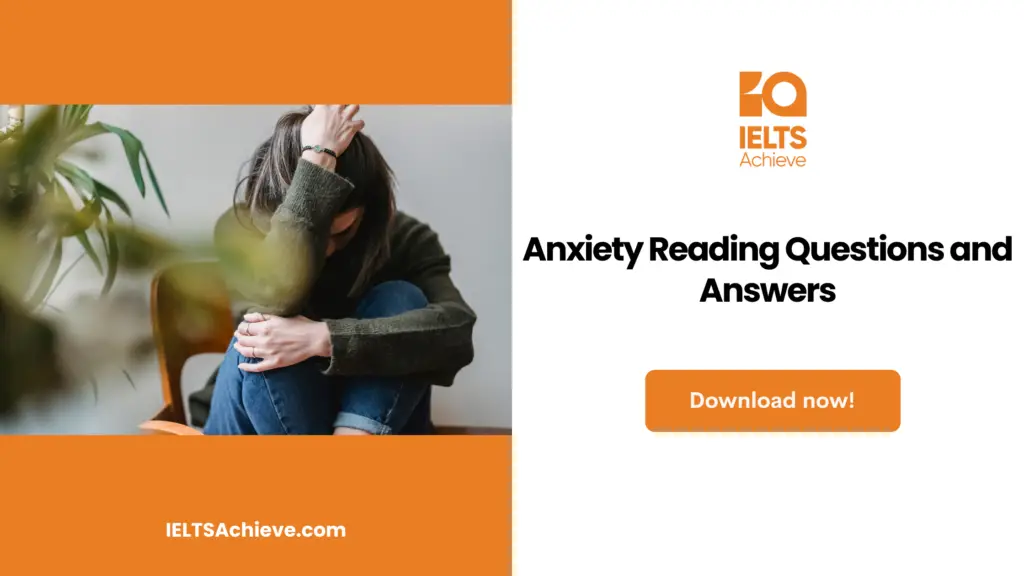The Blog post contains the following IELTS Reading Questions:
- IELTS Reading Short Answer Questions
- IELTS Reading Table Completion
- IELTS Reading Matching Sentence Endings
Stay informed and prepared for success – Explore our comprehensive Reading Test Info page to get valuable insights, exam format details, and expert tips for mastering the IELTS Reading section.
IELTS Reading passage –Anxiety

Anxiety
Anxiety is a common experience that can be a useful motivator or even lifesaver in situations that are objectively dangerous. However, when the anxiety is out of proportion to the danger inherent in a given situation, is persistent and is markedly disabling, an anxiety disorder can be developed.Anxiety is an emotion that all people experience from time to time, and we do that for very good reasons. It has been built into us; we have inherited it from our evolutionary past, because, in general, anxiety has a survival function. If there is a real danger for a primitive man, then anxiety kicks in in an adaptive way. We freeze, we stop doing whatever we were doing, we devote all of your attention to the danger, and our bodies react with a big release of adrenalin, an increase in blood flow to the muscles, getting us ready to run as fast as we can or fight as fiercely as we can.So some anxiety is adaptive, not only for primitive man, but in modern society as well. It helps us to focus on things when we have deadlines and, if someone is driving too fast when we cross the road, it helps us to jump out of the way quickly. So, there is nothing wrong with anxiety in general, and in fact, we would have difficulties if we did not experience it to some extent, but of course, it can get problematic if the danger is one that is imagined rather than real, or the danger is something that is exaggerated. In those cases, particularly if the perceived danger is out of proportion to the real danger, and it is persistent and disabling, then there is a danger of an anxiety disorder. About 17 per cent of the population will have an anxiety disorder at some stage in their life.
Anxiety can be caused in a variety of different ways, but any mental disorder is always difficult to diagnose. Scientists are looking at what role genes play in the development of these disorders and are also investigating the effects of environmental factors, such as pollution, physical and psychological stress, and diet. Several parts of the brain are key actors in the production of fear and anxiety. Using brain imaging technology and neurochemical techniques, scientists have discovered that the amygdala plays a significant role in most anxiety disorders. By learning more about how the brain creates fear and anxiety, scientists may be able to devise better treatments for these disorders.
Anxiety disorders are a very costly problem in terms of society. Some published figures show that, in the US, it cost $60 billion in one year in terms of lost productivity and in terms of excessive medical investigations that many people with anxiety seek, often thinking they have a physical problem.
Given all of this, it is rather worrying that anxiety also has a rather low treatment-seeking rate. Only 10 per cent of people with an anxiety disorder will seek treatment. That seems to be largely because people do not realise there are effective treatments available. Most people tend to think they have had it for most of their lives, so it is just their personality and they cannot change their personality, and so they feel rather hopeless about it.
The first psychotherapy treatment that was shown to be effective was exposure therapy, which essentially encourages people in a graded way to go into their feared situations and stay in them as long as they can and build up their confidence that way. Often, the therapist will accompany the person to a feared situation to provide support and guidance. Group cognitive behaviour therapy has also been shown to be effective. This is a talking therapy that helps people to understand the link between negative thoughts and mood and how altering their behaviour can enable them to manage anxiety and feel in control.There are, of course, drugs that can help people with anxiety. Medication will not cure an anxiety disorder, but it can keep it under control while the person receives psychotherapy. The principal medications used for anxiety disorders are antidepressants, anti-anxiety drugs, and beta-blockers to control some of the physical symptoms. With proper treatment, many people with anxiety disorders can lead normal, fulfilling lives.
There is plenty of evidence that exercise can help with anxiety problems. When stress affects the brain, with its many nerve connections, the rest of the body feels the impact as well. Exercise and other physical activity produce endorphins, which are chemicals in the brain that act as natural painkillers. In addition to this, getting physically tired can help people fall asleep faster and have deeper and more relaxing sleep. As many people suffering from anxiety often have problems with insomnia, just the ability to get a good night’s rest can change people’s whole perspectives.Anxiety is a normal, but highly subjective, human emotion. While normal anxiety serves a beneficial and adaptive purpose, anxiety can also become the cause of tremendous suffering for millions of people. It is important that people recognise excessive anxiety in themselves as soon as possible, as treatment can be very successful and living untreated can be a misery.
Unlock your full potential in the IELTS Reading section – Visit our IELTS Reading Practice Question Answer page now!
Recommended Questions:
Renewable Energy IELTS Reading Question with Answer
Questions 1-3
Complete each sentence with the correct ending (A-E) below. Write the correct letter (A-E) in answer boxes 1-3 on your answer sheet.
1. Experiencing small doses of anxiety can
2. Imagining or exaggerating problems can
3. Nearly one in five people can
A. be very beneficial.
B. never have to deal with anxiety
C. lead to unhelpful levels of anxiety.
D. experience anxiety at some point.
E. increase the possibility of physical disease.
Ready to sharpen your skills in Matching Sentence Endings? Click here to discover expert strategies and techniques for accurately matching sentence endings with the corresponding information in the IELTS Reading section.
Questions 4-6
Answer the questions below. Write NO MORE THAN THREE WORDS AND/OR A NUMBER from the text for each answer. Write your answers in boxes 4-6 on your answer sheet.
4. Which area of the brain have scientists identified as being significant in anxiety problems?
5. What proportion of people look for treatment for their anxiety?
6. What part of themselves do most people blame for their anxiety?
Questions 7-13
Complete the table below. Write NO MORE THAN TWO WORDS from the text for each answer. Write your answers in boxes 7-13 on your answer sheet.
| Treatment for Anxiety | |
| Exposure Therapy | Patients face their fears in a 7 ……………….. fashion, often with their 8 ……………….. |
| Group Cognitive Behaviour Therapy | A talking therapy.It explores the links between 9 ……………….. and feelings.It explores how changing people’s 10 ……………….. can help them regain control. |
| Drugs | These cannot cure people, but they can help in conjunction with 11 ……………….. |
| Exercise | By creating 12 ……………….., the body can help dull the pain of anxiety.It can allow a good sleep for people who suffer from the 13 ……………….. caused by their anxiety. |
Boost your performance in Summary, Notes, Table, and Flowchart Completion tasks. Click here to explore our detailed guide and learn how to effectively complete summaries, notes, tables, and flowcharts in the IELTS Reading section.
Unlock your full potential in the IELTS Reading section – Visit our IELTS Reading Practice Question Answer page now!
Recommended Questions:
Renewable Energy IELTS Reading Question with Answer
Answer:
1. A
2. C
3. D
4. (The) amygdala
5. 10 percent
6. (Their) personality
7. graded
8. therapist
9. (negative) thoughts
10. behaviour
11. psychotherapy
12. endorphins
13. insomnia

We hope you found this post useful in helping you to study for the IELTS Test. If you have any questions please let us know in the comments below or on the Facebook page.
The best way to keep up to date with posts like this is to like us on Facebook, then follow us on Instagram and Pinterest. If you need help preparing for the IELTS Test, join the IELTS Achieve Academy and see how we can assist you to achieve your desired band score. We offer an essay correction service, mock exams and online courses.


